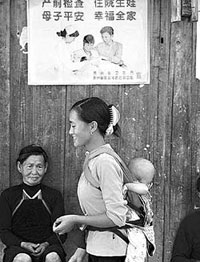Profiles
Village doctor's unflinching devotion
By Liu Jun (China Daily)
Updated: 2006-02-22 06:39
 |
Large Medium Small |
Li and her husband sold the family's only two cows to collect about 2,000 yuan (US$248) for medicines and opened a clinic in their house.
"If a dozen patients come every day, I will be able to support my family," thought Li, who had only a table and a bed in the clinic. She put the medicine in paper boxes and borrowed some equipment from her father, also a rural doctor.
 Li Chunyan, carrying her baby at home. [China Daily] |
On the day Li rushed to save that premature baby, the family expressed their gratitude by giving her the only two yuan (US$0.25) they possessed.
When the baby reached the county hospital, the doctors said the baby would probably suffer permanent brain damage even if it did survive. The baby died after living outside the womb for only eight hours.
That night, Liu Zhijie and other volunteers followed Li back to her clinic, a small room with one corner showing the ravages of a flood a few years ago. The visitors found two pieces of paper on the wall recording what the villagers owed Li. The amount came to some 5,000 yuan (US$620).
Li said she sold her dowry and all the silverware passed down generations in her husband's family. When she still couldn't make ends meet, Li decided to sell the ring given by her husband.
"I was really angry when she sold the ring," said her husband Meng Fanbin during the CCTV programme. "I told her that it might be the only ring I could afford. After she sold the ring, (I thought) she might even want to sell me."
In early 2004, Meng found a job in Guangdong Province and persuaded Li to follow him. At that time, they had only some medicines worth less than 100 yuan (US$12) left.
The day before she was to leave, Li worked in the fields with the other women as usual. She told them, in the Miao language she has learnt from her husband, to take good care of themselves, since she would have to leave.
The next morning, the couple were surprised to find all the villagers coming to see them off. They brought them some 100 yuan, all in 1 yuan notes or coins.
The villagers had sold rice, eggs and other valuables to repay their debts. "They told me: 'Please don't leave. What will happen to us and our children if you leave?' I realized then how much they relied on me," said Li.
She stayed.
Most of the people in Datang Village have received Li's help. Their only doctor has had a hand in more than half the births in the village.
Li's husband did not go to Guangdong, but found a job in Congjiang County. Each month, he made some 300 yuan (US$36), most of which went to the clinic. "When I bring home some money, we think about buying new medicines before anything else," said Meng. "Sometimes I think she doesn't fit into this society. Even though she can't make any money, she is still running the clinic."
"I'm just used to living with these people," said Li. "I don't know how to express myself. But when I see them, I know they need me, or, they need a doctor. Without a doctor, their lives would be really hard."
Li Guangshou, once a newspaper reporter, was one of the volunteers in Datang. He took some 300 pictures at the village and showed them to the media.
"This reflects a lot of issues," said Li during the CCTV programme. "Before this, very few people paid much attention to the medical situation in the countryside."
According to Li Guangshou, Congjiang County has 380 villages, about half of which have no doctors. In the past, the local government had trained medical staff for each village. But very few village doctors can support themselves. The annual loss of some 3,000 yuan (US$360) has forced half of the medical staff to find other means to support their families.
Li Guangshou found this story repeated in many poverty-stricken rural areas.
When Li Chunyan's story became public, more than 200,000 yuan (US$24,820) poured in donations in just six months. She has since built a three-storey clinic in the village.
She plans to run an outpatient department on the ground floor, an in-patient department on the first floor and provide basic health training for the villagers on the second floor.
But Li Guangshou is still worried. The building has already used up 180,000 yuan (US$22,340). Public memory tends to be short and once media coverage wanes, Datang Village may be forgotten, he fears. He worries that once donations dry up, the village doctor will again run into debts and eventually leave.
"I dare not think about the future," said Li Chunyan. "I'm still relying on myself. Help from the public is like the wind. When it passes, things may turn to the old ways again. But I will try my best. The medicines come from donations and it should go to the people."
(China Daily 02/22/2006 page14)